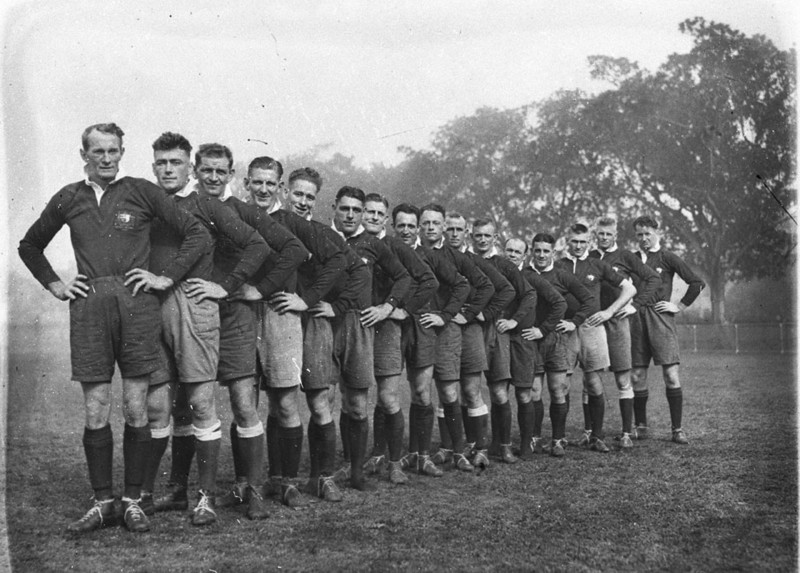|
Eric Weissel
Eric Weissel (;) (1903–1972) was an Australian rugby league footballer, a state and national representative goal-kicking . He played his club career in country New South Wales and is considered one of the nation's finest footballers of the 20th century. Biography and Club career Weissel was born in Cootamundra in 1903. He died in 1972. Weissel played his entire club football career in his home area of the Riverina in southern New South Wales. He rejected offers from Sydney and England clubs, choosing instead to stay in the district he called home, and turned out with five different clubs during an 18-year career: Cootamundra, Temora, Barmedman, Narrandera and Wagga Wagga. With Cootamundra he was captain during two years when they retained the regional Maher Cup with an unbeaten record. Weissel coached Wagga Magpies to win the Clayton Cup in 1939. Representative career After being selected for New South Wales in 1928, Weissel made his international representative debut ... [...More Info...] [...Related Items...] OR: [Wikipedia] [Google] [Baidu] |
Cootamundra
Cootamundra, nicknamed Coota, is a town in the South West Slopes region of New South Wales, Australia and within the Riverina. It is within the Cootamundra-Gundagai Regional Council. At the 2016 Census, Cootamundra had a population of 6,782. It is located on the Olympic Highway at the point where it crosses the Muttama Creek, between Junee and Cowra. Its railway station is on the Main Southern line, part of the Melbourne-to-Sydney line. Cootamundra is the birthplace of Sir Donald Bradman , an Australian cricketer universally regarded as the greatest batsman of all time. It is also known for being the site of Cootamundra Domestic Training Home for Aboriginal Girls, an institution housing Aboriginal girls who were forcibly taken from their families. It is also the home of the Cootamundra wattle. Every year there is a large "Wattle Time" Festival held at the time the wattle starts to bloom, with an art show and festivities. History The traditional owners of the area where ... [...More Info...] [...Related Items...] OR: [Wikipedia] [Google] [Baidu] |
Canowindra
Situated on the Belubula River, Canowindra (pronounced ) is a historic township and largest population centre in Cabonne Shire and is located between Orange and Cowra in the central west of New South Wales, Australia. The curving main street, Gaskill Street, is partly an urban conservation area. Toponymy The name of the town is derived from an Aboriginal language (Wiradjuri) word meaning 'a home' or 'camping place'.{{Cite web , url=http://www.anps.org.au/Canowindra.html , title=ANPS - Working on Canowindra , access-date=15 May 2018 , archive-url=https://web.archive.org/web/20180309224619/http://anps.org.au/Canowindra.html , archive-date=9 March 2018 , url-status=dead History Prior to the arrival of Europeans to Australia, the area now known as Canowindra was occupied for tens of thousands of years by a people known as the Wiradjuri. These "people of the three rivers" were hunters and gatherers who exploited the resources available in the rivers and the lands, particularl ... [...More Info...] [...Related Items...] OR: [Wikipedia] [Google] [Baidu] |
Australian Rugby League Players
Australian(s) may refer to: Australia * Australia, a country * Australians, citizens of the Commonwealth of Australia ** European Australians ** Anglo-Celtic Australians, Australians descended principally from British colonists ** Aboriginal Australians, indigenous peoples of Australia as identified and defined within Australian law * Australia (continent) ** Indigenous Australians * Australian English, the dialect of the English language spoken in Australia * Australian Aboriginal languages * ''The Australian ''The Australian'', with its Saturday edition, ''The Weekend Australian'', is a broadsheet newspaper published by News Corp Australia since 14 July 1964.Bruns, Axel. "3.1. The active audience: Transforming journalism from gatekeeping to gatew ...'', a newspaper * Australiana, things of Australian origins Other uses * Australian (horse), a racehorse * Australian, British Columbia, an unincorporated community in Canada See also * The Australian (disambiguation ... [...More Info...] [...Related Items...] OR: [Wikipedia] [Google] [Baidu] |
Alan Whiticker
Alan James Whiticker (born 1958) is an Australian non-fiction author and publisher, with over 50 published books on history, sport, biography, true crime and lifestyle. Whiticker writes primarily on matters pertaining to the history of the sport of rugby league in Australia, but he has also published works on subjects as diverse as classical film, pop culture, the Wanda Beach Murders and an adaptation of Homer's ''Iliad''. He is a former teacher and commissioning editor for a publishing company but now works as a freelance writer. Early life and education Whiticker was born in Penrith, New South Wales on 15 December 1958. He attended St Dominic's College, Penrith and Nepean College of Advanced Education (now Western Sydney University), where he obtained a Diploma of Teaching in 1979 and a Bachelor of Education (Primary) degree in 1985. He later obtained his master's degree in Education (Administration) in 1997. Before writing full-time, he worked as a primary school teacher an ... [...More Info...] [...Related Items...] OR: [Wikipedia] [Google] [Baidu] |
Eric Weissel Oval Panorama
The given name Eric, Erich, Erikk, Erik, Erick, or Eirik is derived from the Old Norse name ''Eiríkr'' (or ''Eríkr'' in Old East Norse due to monophthongization). The first element, ''ei-'' may be derived from the older Proto-Norse ''* aina(z)'', meaning "one, alone, unique", ''as in the form'' ''Æ∆inrikr'' explicitly, but it could also be from ''* aiwa(z)'' "everlasting, eternity", as in the Gothic form ''Euric''. The second element ''- ríkr'' stems either from Proto-Germanic ''* ríks'' "king, ruler" (cf. Gothic ''reiks'') or the therefrom derived ''* ríkijaz'' "kingly, powerful, rich, prince"; from the common Proto-Indo-European root * h₃rḗǵs. The name is thus usually taken to mean "sole ruler, autocrat" or "eternal ruler, ever powerful". ''Eric'' used in the sense of a proper noun meaning "one ruler" may be the origin of ''Eriksgata'', and if so it would have meant "one ruler's journey". The tour was the medieval Swedish king's journey, when newly elected, to s ... [...More Info...] [...Related Items...] OR: [Wikipedia] [Google] [Baidu] |
